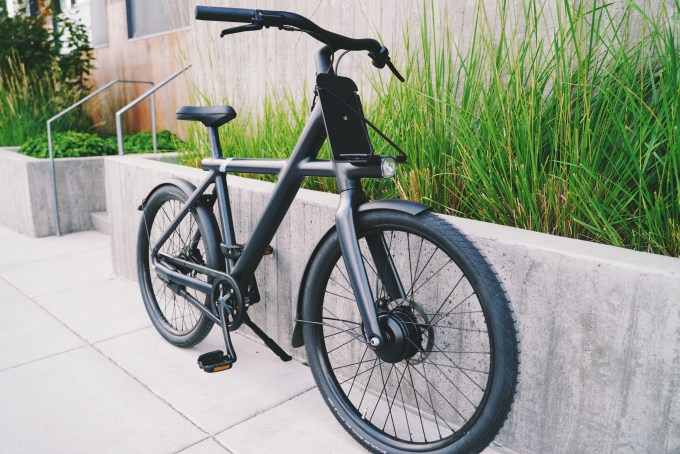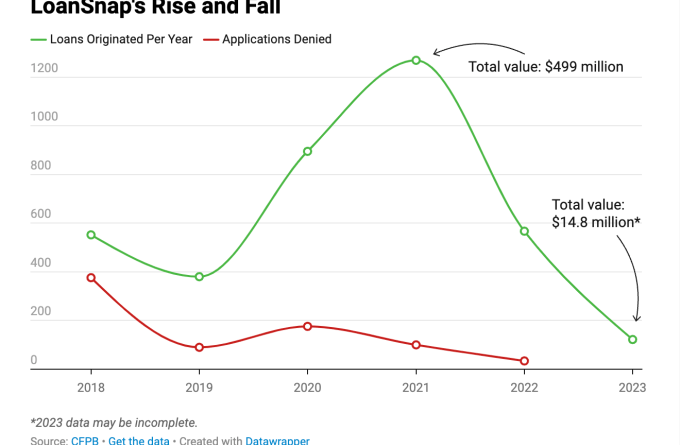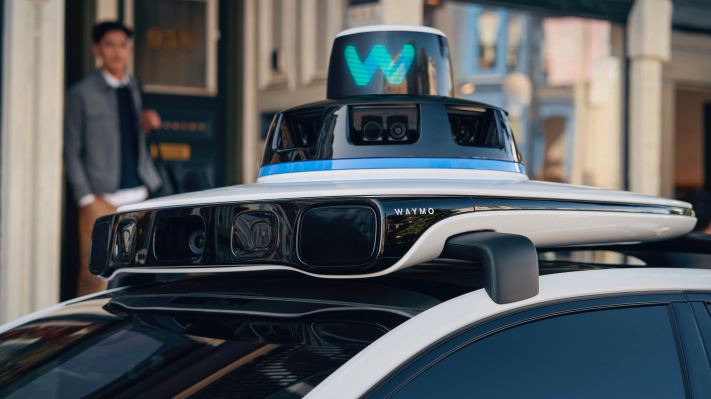
[ad_1]
TechCrunch Mobility is a weekly newsletter dedicated to all things transportation. Sign up here — just click TechCrunch Mobility — to receive the newsletter every weekend in your inbox. Subscribe for free.
Welcome back to TechCrunch Mobility – your central hub for news and insights on the future of transportation.
This week was a busy one with Rivian officially announcing the reveal date for its next-gen EV, a Waymo robotaxi striking a bicyclist (oh and one of its robotaxis was vandalized and burned late Saturday night!), Arrival trying to sell off its UK assets, plus a few scoops on e-motorcycle startup Cake, Ford and Fisker. There’s a lot of ground to cover, so come along for a ride.
Oh, but first, a bit of late-breaking news over the weekend.
Joby Aviation, a company developing all-electric aircraft for commercial passenger service, announced Sunday an agreement with Dubai regulators to launch air taxi services there by early 2026. Joby, a startup that went public in 2021 via a merger with a special purpose acquisition company, said it’s targeting initial operations as early as 2025.
It’s worth noting that under the deal, Joby has exclusive air taxi rights in Dubai for six years and some financial “mechanisms”; Joby didn’t provide further details. Joby has also signed an agreement with Skyports, a company that will design, build and operate four initial vertiport sites across Dubai.
Let’s go!
A little bird
We’ve had many little birds talking to us about Fisker, the EV startup that went public in 2020 via a merger with a special purpose acquisition company. Those conversations combined with a review of internal documents, a number of lawsuits and an investigation by federal regulators came together in a riveting and troubling story by Sean O’Kane.
What did O’Kane find? Fisker Ocean SUV customers have reported more than 100 separate loss-of-power incidents as well as a myriad of other problems, including sudden loss of braking power, problematic key fobs causing them to get locked inside or outside of the vehicle, seat sensors that don’t detect the driver’s presence and the SUV’s front hood suddenly flying up at high speeds.
Customers also complained about the service department. After our story was published, another little bird told us that Fisker’s global service director was recently let go.
Got a tip for us? Email Kirsten Korosec at kirsten.korosec@techcrunch.com or Sean O’Kane sean.okane@techcrunch.com. If you prefer to remain anonymous, click here to contact us, which includes SecureDrop (instructions here) and various encrypted messaging apps.
Deal of the week
India is one of the largest two-wheeler markets in the world. And a whole new crop of startups — like startup River — are popping up on the scene thanks to demand for zero-emission vehicles.
River recently raised $40 million in a Series B funding round led by Japan’s Yamaha Motor. Existing investors Al-Futtaim Automotive, Lowercarbon Capital, Toyota Ventures, Trucks VC and Maniv Mobility also participated.
The startup is facing a competitive market as many companies are vying for a piece of the EV pie. River is betting that it will win over Indian customers with Indie, a utility lifestyle-focused product that has been described as an “SUV” two-wheeler.
Other deals that got my attention …
Elroy Air, a South San Francisco-based startup developing autonomous cargo drones, raised $48.9 million, according to a regulatory filing.
Guided Energy, a French startup that raised $5.2 million from Sequoia Capital and Dynamo Ventures at the end of 2023, is building a software tool that will help EV fleet operators with charge management and dispatch.
Oto, an Indian startup that built a financing software platform for two-wheeled EVs, raised $10 million in a round led by GMO Venture Partners.
Starship Technologies, a delivery robotics startup out of Estonia, raised $90 million in funding round co-led by two previous backers: Plural and Iconical. It brings the total raised by Starship to $230 million, with previous backers including the Finnish-Japanese firm NordicNinja, the European Investment Bank, Morpheus Ventures and TDC.
Notable reads and other tidbits
Autonomous vehicles
An administrative law judge with the California Public Utilities Commission held a settlement hearing regarding the October 2 incident that left a pedestrian, who had initially been hit by a human-driven car, stuck under and then dragged by a Cruise robotaxi.
The hearing rehashed much of what Quinn Emmanuel – the law firm GM hired to investigate the October 2 incident — revealed in an independent report. But it’s worth noting that throughout the exchange, Cruise struck an extremely conciliatory tone. Craig Glidden, GM’s EVP of legal and policy who was appointed in December chief administrative officer at Cruise, was particularly ingratiating.
At one point, he seemed to agree with paying a higher fine, which under statute would be $112,000. Here’s what he said.
“It was regrettable. It was a mistake and Cruise is attempting to make right with the mistake. I’m not here to quibble about whether it’s $75,000 or $112,000. We want to get the matter settled because we want to move forward and we want to advance the mission of bringing driverless cars that are safer to the public and also greater accessibility to the public to the market. So we’re more than happy to be compromised in any ways that the court would see fit or the commission would see fit to get this matter behind us.”
Waymo has the attention of regulators in California after one of its robotaxis struck a bicyclist in San Francisco. The cyclist suffered minor injuries. Waymo said its robotaxi was stopped at a four-way intersection as a large truck was driving in the opposite direction. The car then moved into the intersection and collided with the cyclist who was behind the truck.
TechCrunch spoke to the Department of Motor Vehicles and the California Public Utilities Commission — the two agencies that control permits that allow companies like Waymo to test, deploy and commercially charge for driverless rides. The CPUC said it was “gathering information from Waymo” and the DMV told me the agency “is reviewing the incident.” We’ll see if this turns into anything more.
One more Waymo item. At around 9 p.m. Saturday evening, a crowd surrounded an empty Waymo robotaxi, began rocking it, smashing windows and ultimately lit it on fire courtesy of fireworks. FriscoLive415 shared the video on X. Pretty insane footage. A Waymo spokesperson told TechCrunch the vehicle was not transporting any riders and no injuries have been reported. The company is “working closely with local safety officials to respond to the situation.”
Electric vehicles, charging & batteries
Arrival announced that its U.K. division is entering administration, the country’s version of bankruptcy.
Electric motorcycle company Cake held talks with Harley-Davidson and other automakers in 2023 as it fought to stay alive, founder and CEO Stefan Ytterborn told TechCrunch.
Cowboy is rolling out an on-demand service program for basic maintenance, customization and repairs, delivered at the e-bike owner’s home.
Ford has been quietly working on a low-cost EV. The company created a skunkworks project two years ago that’s based in Irvine, California and led by ex-Tesla and Ford Advanced EV development boss Alan Clarke. Notably, the team includes engineers from Auto Motive Power (AMP), the EV power startup that the automaker acquired in November 2023. AMP founder Anil Paryani, who coincidentally overlapped with Clarke for about five years at Tesla, is also part of the skunkworks project.
Rivian will reveal its smaller, cheaper R2 SUV on March 7. Stay tuned!
Toyota will spend an additional $1.3 billion to prepare its Kentucky factory for production of a new three-row all-electric SUV designed for U.S. consumers
Gig economy
Uber hit a major milestone that a few years ago I wasn’t sure would ever be met. The ride-hailing and delivery app reported a full-year profit (driven by operating income) as a public company. And it seems that profit momentum is expected to continue into the first quarter. Uber has hit an annual profit before, but it was largely due to its investments. In 2023, the company’s profits also came from its operations.
Reminder that Lyft will post its fourth-quarter and full-year earnings after markets close February 13.
People
Getaround, a company that helps vehicle owners rent out their cars, trucks and SUVs to other peers, is cutting 30% of its North American workforce as part of a restructuring. Getaround cut 10% of its staff in February 2023.
General Motors hired battery expert and ex-Tesla executive Kurt Kelty to be the automaker’s new vice president of batteries — a brand new role for the company.
This week’s wheels
This week’s wheels might get the attention of e-bike followers. Editor Taylor Hatmaker writes this about her “zombie” Van Moof.
My VanMoof e-bike isn’t dead, but it’s not quite alive either. I bought an X3 from VanMoof after I reviewed the bike for TechCrunch back in 2021 and came away wildly impressed. The bike was excellent; but it was also a personal revelation, empowering me —a lazy fair-weather cyclist — to bike around my city (Portland, OR) when I might otherwise use a car.
When I bought my VanMoof, on sale at the time, I knew it was a risk. I spent the money, knowing that in the worst-case scenario my bike could turn into a $2,000 brick. That scenario arrived last year when VanMoof declared bankruptcy.
Lavoie bought the company’s remains late last summer, providing a glimmer of hope that the notoriously fickle bikes full of bespoke components will still be serviceable in the future. In the meantime, VanMoof owners like myself scrambled to download apps like Bikey, made by Cowboy, to salvage the Digital keys linking us to our bikes.
I still have a lot of affection for my 30-pound possible-future-paperweight, which I nervously power on and connect my phone to a few times a week. It’s been pouring for months — not the kind of weather I’ll bike in any more — but I hope when Spring rolls around that my X3 shows some fresh signs of life too.
[ad_2]
Source link










